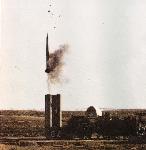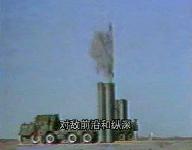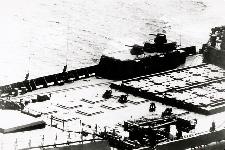




 The S-300PMU [SA-10 land-based, SA-N-6 naval version] surface-to-air missile system is able to engage a number of targets simultaneously, countering intensive aircraft raids at low-to-high altitude. The SA-10 offers significant advantages over older strategic surface-to-air missile systems, including multitarget handling and engagement characteristics, a capability against low altitude targets with small radar cross-sections such as cruise missiles, a capability against tactical ballistic missiles, and possibly a potential to intercept some types of strategic ballistic missiles.
The first SA-10 site became operational in 1980. Over 80 sites were operational by 1987, when work was progressing on at least another 20 sites. Nearly half of these sites were located near Moscow. This emphasis on Moscow as well as the deployment patterns noted for the other SA-10 sites suggested a first priority on terminal defense of command-and-control, military, and key industrial complexes. A program to replace all of the older strategic SAM systems with the SA-10, well under way by 1996, has been considered by experts to be one of the most successful reequipment programs of the post-Soviet armed forces.
The S-300PMU [SA-10 land-based, SA-N-6 naval version] surface-to-air missile system is able to engage a number of targets simultaneously, countering intensive aircraft raids at low-to-high altitude. The SA-10 offers significant advantages over older strategic surface-to-air missile systems, including multitarget handling and engagement characteristics, a capability against low altitude targets with small radar cross-sections such as cruise missiles, a capability against tactical ballistic missiles, and possibly a potential to intercept some types of strategic ballistic missiles.
The first SA-10 site became operational in 1980. Over 80 sites were operational by 1987, when work was progressing on at least another 20 sites. Nearly half of these sites were located near Moscow. This emphasis on Moscow as well as the deployment patterns noted for the other SA-10 sites suggested a first priority on terminal defense of command-and-control, military, and key industrial complexes. A program to replace all of the older strategic SAM systems with the SA-10, well under way by 1996, has been considered by experts to be one of the most successful reequipment programs of the post-Soviet armed forces.
This vertically launched missile uses a single-stage solid propellant rocket motor. It is normally armed with a 100 kg HE-fragmentation warhead with a proximity fuse, though a low yield tactical nuclear type is believed to be an alternative warhead option. The missile's vertical launch trajectory provides fastest available reaction time capability to counter targets approaching from any azimuth. Missile engagement altitude extend from 25 m up to about 30000 m. The maximum engagement range is stated as at least 90000 m, though in practice it is probably greater.
The SA-10A launch complex consists of a missile battery which includes a battery command post and engagement control center, the large CLAM SHELL 3D continuous wave pulse Doppler target acquisition radar, the FLAP LID A I-band multi-function phased-array trailer-mounted engagement radar with digital beam steering in hardened sites, and up to 12 semi-trailer erector-launchers which mount four tubular missile container-launchers. The towing unit for the semi-trailer erector-launcher is the KrAZ-260V (6 x 6) tractor truck. The launchers are usually positioned on concrete pads with the trailers being leveled by the use of four hydraulic jacks. An S-300PMU Regiment comprises three such batteries and employs the BIG BIRD 4 meter tall F-band long-range, 3D surveillance and tracking radar at the Regimental command post for initial target detection.
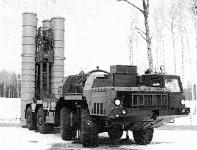 In the mid-1980s design work on the mobile S-300PMU SA-10B GRUMBLE Mod 1 was completed. This version of the weapon is carried and vertically launched from a dedicated four-round capacity transporter-erector launcher vehicle based on the MAZ-7910 (8 x 8) truck chassis. The combined engagement radar and control station is mounted on the same chassis. The SA-10B mobile missile battery comprises the combined FLAP LID B engagement radar and engagement control/command post station mounted on a MAZ-7910 chassis, up to 12 TELs (SPU: mobile launcher unit), a trailer-mounted 36D6; CLAM SHELL 3D 360� scanning target designation radar, and a maintenance section. The SA-10B Regiment consists of three such batteries with an additional radar section and a number of TZM (transport-loader vehicles) MAZ-7910 transloaders for resupply purposes. The TEL carries a total of four sealed container-launcher cylinders, each of which is used for the storage, transport and launching of a missile. When traveling the launcher system is carriedin the horizontal position but at the launch site is elevated to an
angle of 90�.
In the mid-1980s design work on the mobile S-300PMU SA-10B GRUMBLE Mod 1 was completed. This version of the weapon is carried and vertically launched from a dedicated four-round capacity transporter-erector launcher vehicle based on the MAZ-7910 (8 x 8) truck chassis. The combined engagement radar and control station is mounted on the same chassis. The SA-10B mobile missile battery comprises the combined FLAP LID B engagement radar and engagement control/command post station mounted on a MAZ-7910 chassis, up to 12 TELs (SPU: mobile launcher unit), a trailer-mounted 36D6; CLAM SHELL 3D 360� scanning target designation radar, and a maintenance section. The SA-10B Regiment consists of three such batteries with an additional radar section and a number of TZM (transport-loader vehicles) MAZ-7910 transloaders for resupply purposes. The TEL carries a total of four sealed container-launcher cylinders, each of which is used for the storage, transport and launching of a missile. When traveling the launcher system is carriedin the horizontal position but at the launch site is elevated to an
angle of 90�.
The combined FLAP LID-B radar/engagement control vehicle has the 2.75 m2 planar array antenna on a box-like antenna mount and support systems container. When traveling the array is carried horizontally, and when deployed it is raised above the container to an angle of approximately 60�.
The battery takes only five minutes to deploy once it comes to the halt. The vehicles have electronic inter-vehicle communications and data transmission links with elevatable pole-type antenna, and thus it does not require interconnecting vehicle cables. Each of the MAZ-7910 derivative vehicles has four hydraulic jacks positioned either side between the first/second and third/fourth road wheels which are lowered to the ground to provide a more stable and level environment.
Missile guidance is of the Track-Via-Missile (TVM) type with the FLAP LID guidance radar capable of engaging up to six targets simultaneously, with two missiles assigned per target to ensure a high kill probability. Maximum target velocity is stated as 4200 km/h with the battery capable of firing three missiles per second.
If the battery is employed in rugged terrain or forest then the engagement radar system can be mounted on a special trailer-mounted extendible 24.4 m high tower to improve radar coverage. The use of this extended-range radar for low level engagements increases the system's range to 43,200 m from the original 32,000 m. In its sealed container-launcher cylinder the missile is considered to be a round of ammunition and is said not to require any check-ups or adjustments for a period of 10 years.The S-300PMU1 is an extended range version of S-300PMU with a limited anti-ballistic missile capability, including capabilities against aerodynamic targets with speeds up to 3 kilometers/second.
The S-300PMU2 Favorit variant is a new missile with larger warhead and better guidance with a range of 200 km, versus the 150 km of previous versions. Unveiled at the MAKS'97 exhibition in August 1997, it represents a thorough modification of the S-300PMU1. The first tests were performed on 10 August 1995 at the Kapustin Yar firing range. One new element is the entirely new 96L6E autonomous mobile radar, which works in conjunction with the 83M6E2 control post and S-300MPU2 launchers. The new 48N6E2 missile, developed by MKB Fakel, weighs 1,800 kg, and is 7.5 m long and 0.5 m in diameter. After a cold start in the upright position with help of a catapult, the 48N6E2 accelerates up to 1,900 m/s in 12 sec time, and then approaches the target from above. The 48N6E2 differs from the older 48N6E in having a new warhead specially designed for destroying ballistic missiles, with a warhead weight of 145 kg versus 70-100 kg.The S-300PMU2 Favorit can engage targets flying from 10 m to 27 km above the surface at a speed of up to 10,000 km/h. It is claimed that it has a kill ratio ranging from 0.8 to 0.93 against aircraft and from 0.8 to 0.98 against Tomahawk-class cruise missiles.
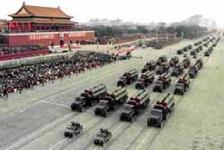 In the early 1990s China imported 100-120 S-300 missile systems which are deployed aroung Bejing, and it has been suggested that China intends to obtain a license to
produce them, with a designation variously reported as either HQ-10 or HQ-15. The first Chinese copy have been tested, but all the components of the first copy version were imported from Russia. The October 1999 parade celebrating the 50th anniversary of the People's Republic of China in Beijing featured a large number of truck towed quad-cannister systems associated with the SA-10.
India
In the early 1990s China imported 100-120 S-300 missile systems which are deployed aroung Bejing, and it has been suggested that China intends to obtain a license to
produce them, with a designation variously reported as either HQ-10 or HQ-15. The first Chinese copy have been tested, but all the components of the first copy version were imported from Russia. The October 1999 parade celebrating the 50th anniversary of the People's Republic of China in Beijing featured a large number of truck towed quad-cannister systems associated with the SA-10.
India
Specifications |
|
| Builder | Almaz Scientific-Production Association |
| Lemgth | 7.0 m 7.5 m - 48N6 S-300PMU1 |
| Diameter | 0.45 m 0.50 m - 48N6 S-300PMU1 |
| Weight | 1,480 kg 1,800 kg - 48N6 S-300PMU1 |
| Propulsiom | Single-stage, solid-fuel rocket |
| Range, (km) |
45 km - 5V55K 90 km - 5V55R 150-200 km - 48N6 S-300PMU1 |
| Altitude, (m) | 30,000 m |
| Basic load on vehicle | |
| Detection range, km | |
| Reaction time, sec | |
| Speed | 1.7 km./sec S-300P 2.0 km./sec S-300PMU |
| Reload time | |
| Warhead |
70-100 kg high explosive - 5V55K 145 kg high explosive - 48N6 S-300PMU1 |
| Command guidance | |
| Radar(s) |
Flap Lid or Tombstone engagement radar Clam Shell acquisition radar Big Bird designation radar |
| Emplace/displace time (min) | |
| Support vehicles | |
| Chassis | |
